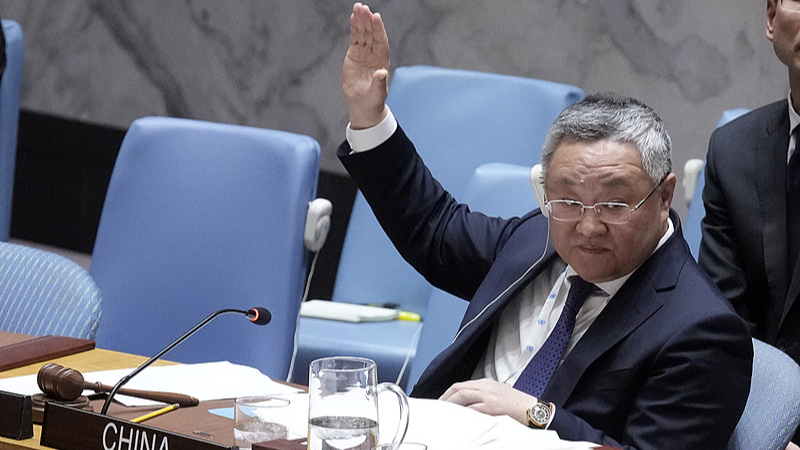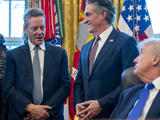Top Six Takes on China and the World Today

The Syrian Conflict and China's Role in the United Nations
In recent developments, China's permanent representative to the United Nations, Fu Cong, highlighted ongoing concerns regarding Syria's political and security landscape. At a UN Security Council meeting, China urged Syrian interim authorities to commit to an inclusive political transition while taking firm measures to combat terrorism. Notably, the disorder in regions like Latakia and Tartus has prompted international outcry.
CGTN covers China's strategic narrative, emphasizing China's interest in a credible political transition and regional stability. The envoy condemned actions by terrorist factions and criticized Israeli military actions in Syria, reinforcing China's stance on sovereignty and territorial integrity. This diplomatic engagement demonstrates China’s active participation in global security discussions, reflecting its broader geopolitical strategy aimed at fostering stability while expanding its influence in conflict zones.
Furthermore, China's position against external military actions and emphasis on regional sovereignty highlights its principle-driven approach to international relations, potentially influencing other global players' strategies in the Middle East.
U.S.-Russia-Ukraine Relations: Seeking Ceasefire amidst Complex Negotiations
The tripartite negotiations involving Russia, Ukraine, and the United States have once again underscored the intricacy of achieving lasting peace in the region. Discussions held in Riyadh exposed the varied priorities of each party, with the U.S. aiming to disengage from ongoing conflicts initiated under previous administrations and Russia seeking a resolution on both military and post-war economic issues, especially concerning NATO’s expansion.
Chinese experts, featured on CGTN, critiqued U.S. mediation tactics as being overly simplistic, disregarding historical complexities, and other nations' stakes. This scenario illustrates the limits of unilateral diplomatic maneuvers and raises questions about the sustainability of peace efforts without direct and honest dialogue between conflicting parties. As anticipated by experts like Kang Jie and Cui Hongjian, achieving a substantive ceasefire requires integrating all affected stakeholders and acknowledging the broader geopolitical implications, including European Union's role and potential influence.
China-Honduras Relations: Strengthening Bilateral Ties
According to Xinhua's recent report, China and Honduras have made significant moves toward deepened cooperation, encapsulated through agreements on technical and research exchanges in various critical sectors. The engagement underscores China's expansive diplomatic strategy in Latin America, aiming to enhance socio-economic collaborations, which are seen as mutual benefits leading to broad prosperity.
The report suggests these diplomatic efforts are not only about economic gains but also about fostering a deeper friendship between their peoples, consistent with China’s broader international soft power initiatives. This partnership could have ripples throughout the region, subtly challenging the traditionally strong U.S. influence in its neighboring states and possibly encouraging more countries to seek similar cooperative agreements with China.
Geopolitical Tensions in Greenland
As geopolitical tectonics shift, Denmark's Prime Minister Frederiksen declares U.S. diplomatic and military interest in Greenland as "unacceptable pressure," focusing on sovereignty concerns. The CCTV report highlights a backdrop where Greenland, situated strategically and rich in untapped resources, faces new geopolitical spotlight as superpowers assert influence.
This narrative indicates Denmark's firm stance against U.S. attempts to deepen its presence in Greenland, which it insists remains a matter of Danish sovereignty. It also reflects a broader global concern about territorial integrity amidst pressures from larger nations seeking strategic advantages. Moreover, this scenario stresses a growing recognition of environmental and strategic challenges that come with claims and counterclaims over territory amid continuing climate changes opening new resource avenues in the Arctic.
Hacking Washington: Yemen Chat Leak Controversy
The mishap involving the inadvertent invitation of a journalist into a confidential chat concerning U.S. airstrikes in Yemen highlights challenges in managing security in the digital era. According to CGTN, U.S. National Security Advisor Mike Waltz took responsibility, while U.S. President Donald Trump described the incident as a minor "glitch." The debacle brought scrutiny from Senate Intelligence Committees, questioning operational security and reinforcing the need for stringent control over sensitive communications.
In a broader context, such security breaches impact the perception of U.S. reliability and control in military operations, with political ramifications that extend beyond the immediate narrative. This incident underscores the complexities of information security and the potential geopolitical fallout from digital communication errors, which could affect diplomatic relationships and security collaborations globally.
Enhancing U.S.-China Relations: A Call for Constructive Engagement
CCTV's interview with former U.S. Commerce Secretary Carlos Gutierrez sheds light on how mutual understanding and active dialogue can stem rising tensions between the U.S. and China. Gutierrez advocates for establishing a constructive bilateral relationship to avoid detrimental conflicts, with both nations bearing global influence.
This perspective represents a pragmatic approach amid increasing competition and antagonism, highlighting the potential for cooperative engagement in areas of mutual interest to benefit the global community. As one assesses U.S.-China relations, this narrative adds another layer to understanding how economic diplomacy and interpersonal relationships might play a part in shaping a new cooperative global order.


